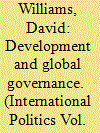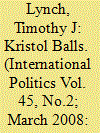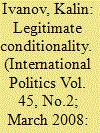|
|
|
Sort Order |
|
|
|
Items / Page
|
|
|
|
|
|
|
| Srl | Item |
| 1 |
ID:
086306


|
|
|
|
|
| Publication |
2008.
|
| Summary/Abstract |
Despite the proliferation of literature on 'global governance', relatively little attention has been paid to the role of 'development' agencies in the construction of regimes of global governance. This article presents an empirical study centred on the role of the World Bank in financial sector governance. The evolution of World Bank policies and practices in this area demonstrates how the World Bank has become an important instrument in the construction of regimes of global governance. This article concludes with some reflections on what this case suggests about how we should explain the emergence of regimes of global governance, and what the World Bank's financial sector reform activities mean for the relationship between development and global governance.
|
|
|
|
|
|
|
|
|
|
|
|
|
|
|
|
| 2 |
ID:
086300


|
|
|
|
|
| Publication |
2008.
|
| Summary/Abstract |
This article investigates the way in which the Council of Europe enforced the norm against capital punishment in Europe. The Council of Europe, through both moral persuasion and centripetal pressure, compelled its member states to adopt the regionally promoted human rights standard. Ukraine, where the very last execution in Europe took place, accepted the norm after a number of years of resistance and in the face of public opposition to abolition. It was possible because of the adamant role of the Council of Europe in attempting to build a death penalty-free zone in Europe and Ukraine's strategic will to be integrated within the European regional community.
|
|
|
|
|
|
|
|
|
|
|
|
|
|
|
|
| 3 |
ID:
086304


|
|
|
|
|
| Publication |
2008.
|
| Summary/Abstract |
This paper assesses American neoconservative policy prescriptions for democratizing political Islam and considers the sources of the neoconservative understanding of the Arab Muslim world. Neoconservative analyses of the Middle East are almost exclusively normative, arguing what US policy toward the region should be. Their aims are ambitious and inherently controversial. The paper examines what various neoconservatives have said and written about Islam and its democratic potential. The paper concerns itself with the neoconservative conceptualization of Middle East politics. The paper argues that presently only American neoconservatism, despite its variations, and despite some obvious flaws, offers tenable prescriptions for regime destabilization and an attendant political liberalization of Arab politics.
|
|
|
|
|
|
|
|
|
|
|
|
|
|
|
|
| 4 |
ID:
086302


|
|
|
|
|
| Publication |
2008.
|
| Summary/Abstract |
This article analyzes European Union (EU) conditionality regarding the safety of Central and East European nuclear power reactors. Bulgaria, Lithuania, and Slovakia breached or evaded shutdown pledges made in exchange for foreign aid in the early 1990s. Conditionality proved more effective when the European Commission required reactor closure as a condition for accession. However, EU pressure gave rise to legitimacy concerns, as candidate country governments agreed to phase out reactors against the wishes of their citizens. The resultant problems exposed inherent discrepancies between conditionality and democracy. Such discrepancies cannot be resolved by the illusory concept of 'ownership'. Bridging two literatures, the article examines EU conditionality in the context of enlargement's 'democratic deficit'. Previously overlooked factors that discredit conditionality include stereotyping, symbolism, the reluctance to admit mistakes, and popular conspiracy theories about donor motives. Greater attentiveness to such factors can enhance conditionality's legitimacy.
|
|
|
|
|
|
|
|
|
|
|
|
|
|
|
|
| 5 |
ID:
086299


|
|
|
|
|
| Publication |
2008.
|
| Summary/Abstract |
Since the 1990s, international relations theory (IR) has supposedly been in the grip of a 'Third Debate', this time between positivism and postmodernism. While many have cast doubt as to whether this is in fact the case, and others have argued that it is time to move beyond it, it remains true to say that the issue of positivism vs postpositivism has occupied the minds of a number of academic analysts in recent years. This article takes the more radical position of questioning whether this epistemological debate - if, indeed, one accepts that there is one - has any real import in the sense of influencing the empirical research that IR scholars actually conduct. In short, whether one embraces a positivist or a postmodernist epistemology (for example) has little practical effect upon one's empirical findings. By extension, this argument suggests that the emphasis on the philosophical underpinnings of IR, while not necessarily misconceived in and of itself, has thus far not been central to what IR scholars actually do.
|
|
|
|
|
|
|
|
|
|
|
|
|
|
|
|
| 6 |
ID:
086303


|
|
|
|
|
| Publication |
2008.
|
| Summary/Abstract |
In his article in International Politics, Harald Müller (2004) attempts to explain why some democracies fight wars through the development of two ideal types of democracy, one that adopts the stance of militant liberalism and the other of pacifist liberalism. This article offers a critique of Müller's argument and his classification of militant and pacifist democracies. As an alternative explanation I turn to empirical uniformities on war that have been identified through quantitative, data-based research as increasing the probability of the onset of war. These factors include power status, duration of independence, number and type of borders, the presence of enduring rivalry, and the level of economic development. I will demonstrate that these factors are more important in explaining the warlike nature of some democracies.
|
|
|
|
|
|
|
|
|
|
|
|
|
|
|
|
|
|
|
|
|